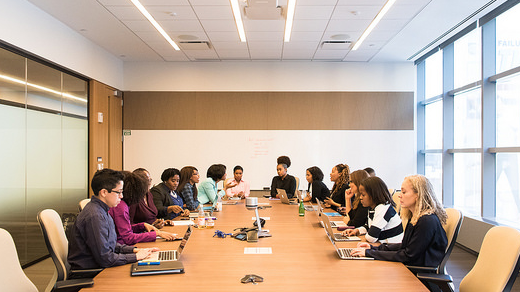mirror of
https://github.com/LCTT/TranslateProject.git
synced 2025-01-10 22:21:11 +08:00
61 lines
4.5 KiB
Markdown
61 lines
4.5 KiB
Markdown
5 tips for facilitators of agile meetings
|
||
======
|
||
Boost your team's productivity and motivation with these agile principles.
|
||
|
||

|
||
|
||
As Agile practitioner, I often hear that the best way to have business meetings is to avoid more meetings, or to cancel them altogether.
|
||
|
||
Do your meetings fail to keep attendees engaged or run longer than they should? Perhaps you have mixed feelings about participating in meetings—but don't want to be excluded?
|
||
|
||
If all this sounds familiar, read on.
|
||
|
||
### How do we fix meetings?
|
||
|
||
To succeed in this role, you must understand that agile is not something that you do, but something that you can become.
|
||
|
||
Meetings are an integral part of work culture, so improving them can bring important benefits. But improving how meetings are structured requires a change in how the entire organization is led and managed. This is where the agile mindset comes into play.
|
||
|
||
An agile mindset is an _attitude that equates failure and problems with opportunities for learning, and a belief that we can all improve over time._ Meetings can bring great value to an organization, as long as they are not pointless. The best way to eliminate pointless meetings is to have a meeting facilitator with an agile mindset. The key attribute of agile-driven facilitation is to focus on problem-solving.
|
||
|
||
Agile meeting facilitators confronting a complex problem start by breaking the meeting agenda down into modules. They also place more value on adapting to change than sticking to a plan. They work with meeting attendees to develop a solution based on feedback loops. This assures audience engagement and makes the meetings productive. The result is an integrated, agreed-upon solution that comprises a set of coherent action items aligned on a goal
|
||
|
||
### What are the skills of an agile meeting facilitator?
|
||
|
||
An agile meeting facilitator is able to quickly adapt to changing circumstances. He or she integrates all stakeholders and encourages them to share knowledge and skills.
|
||
|
||
To succeed in this role, you must understand that agile is not something that you do, but something that you can become. As the [Manifesto for Agile Software Development][1] notes, tools and processes are important, but it is more important to have competent people working together effectively.
|
||
|
||
### 5 tips for agile meeting facilitation
|
||
|
||
1. **Start with the problem in mind.** Identify the purpose of the meeting and narrow the agenda items to those that are most important. Stay tuned in and focused.
|
||
|
||
2. **Make sure that a senior leader doesn’t run the meeting.** Many senior leaders tend to create an environment in which the team expects to be told what to do. Instead, create an environment in which diverse ideas are the norm. Encourage open discussion in which leaders share where—but not how—innovation is needed. This reduces the layer of control and approval, increases the time focused on decision-making, and boosts the team’s motivation.
|
||
|
||
3. **Identify bottlenecks early.** Bureaucratic procedures or lack of collaboration between team members leads to meeting meltdowns and poor results. Anticipate how things might go wrong and be prepared to offer suggestions, not dictate solutions.
|
||
|
||
4. **Show, don’t tell.** Share the meeting goals and create the meeting agenda in advance. Allow time to adjust the agenda items and their order to achieve the best flow. Make sure that the meeting’s agenda is clear and visible to all attendees.
|
||
|
||
5. **Know when to wait.** Map out a clear timeline for the meeting and help keep the meeting on track. Understand when you should allow an item to go long versus when you should table a discussion. This will go a long way toward helping you stay on track.
|
||
|
||
|
||
|
||
|
||
The ultimate goal is to create a work environment that encourages contribution and empowers the team. Improving how meetings are run will help your organization transition from a traditional hierarchy to a more agile enterprise.
|
||
|
||
|
||
--------------------------------------------------------------------------------
|
||
|
||
via: https://opensource.com/article/18/10/agile-culture-5-tips-meeting-facilitators
|
||
|
||
作者:[Dominika Bula][a]
|
||
选题:[lujun9972][b]
|
||
译者:[译者ID](https://github.com/译者ID)
|
||
校对:[校对者ID](https://github.com/校对者ID)
|
||
|
||
本文由 [LCTT](https://github.com/LCTT/TranslateProject) 原创编译,[Linux中国](https://linux.cn/) 荣誉推出
|
||
|
||
[a]: https://opensource.com/users/dominika
|
||
[b]: https://github.com/lujun9972
|
||
[1]: http://agilemanifesto.org/
|